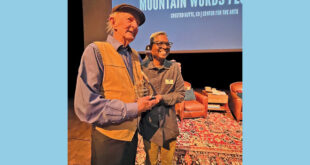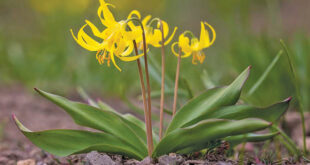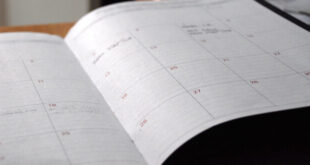Resolution (noun): A firm decision to do or not to do something. To settle or find a solution to. To decide firmly on a course of action. From Latin resolvere, from re- (expressing intensive force) + solvere ‘loosen.’
Don’t feel guilty if you’ve already broken most of the resolutions you made as the promise of a new year waxed high with the hope of change. A University of Washington study in 1997 found 47 percent of the 100 million Americans who make New Year’s resolutions break them after two months. It hasn’t gotten any better in this decade either, as the numbers have grown to 80 percent, according to more studies done at the University of Minnesota.
A CBS poll showed 68 percent of Americans in general no longer even make New Year’s resolutions and the over-30 crowd is less likely to make resolutions at all.
Nevertheless, for those who do continue to make resolutions, the top one seems to be “losing weight,” followed by “exercising more,” with “spending less and saving more,” “quitting smoking” and “being a better person” tied for third.
It is believed that the Babylonians were the first to make New Year’s resolutions, around 4,000 years ago, and you can bet that since then people have been breaking those self-inflicted promises. The ancient Babylonians’ new year, which began in March, saw resolutions that were far easier to keep than the complex commitments we make to ourselves today. They would promise to return borrowed objects and pay their debts. Much easier than losing 20 pounds, or giving up smokes, alcohol and chocolate. Maybe committing to a resolution is too inhibiting for most of us since the very definition of the word “resolution” is “to decide firmly on a course of action.” If you wake up New Year’s Day and immediately slip back into that pattern you vowed to change at midnight, you should ditch the resolution and adopt an “intention” instead, because intending to do something is less intimidating. It’s an aim, as in, “I aim to be on time more.” There’s leeway within an intention that doesn’t scream failure. It’s more likely to be attainable since it’s not an absolute.
You might also ask yourself why you want to make those particular changes in your life anyway, before you wind up asking, “What was I thinking?” when reality kicks in. Will it make you happy? If your intentions coincide with your principles, and they enhance your happiness, and hopefully uplift those around you, your chances of achieving your goals are far greater. Don’t paralyze yourself with ridiculous expectations and absolutely don’t deprive yourself, abstaining from things you love. If you like bacon-smothered cheeseburgers, go eat them. Why punish yourself? Change, as it’s been said, is the only constant in life and reinventing ourselves, particularly at the new year, is like having a blank canvas that we get to throw our favorite colors on to paint the scene we want to see.
In ancient Rome, the new year was changed from March to the first day of the month of Januarius since Janus was the god of doors, gates and beginnings, and he had two faces—one looking back and one to the future, simultaneously. To base our future intentions from a perspective of the past seems logical since it would be difficult to plot a course if you don’t know where you’ve come from or where you’re going. During Rosh Hashanah, the Jewish New Year, through Yom Kippur, the Day of Atonement, followers reflect upon their mistakes over the year while seeking forgiveness. Early Christians believed the first day of the new year should be spent reflecting on past mistakes and resolving to improve oneself in the new year. New Year’s resolutions partially came from the Catholic Lenten practices of giving up something, albeit for only 46 days as opposed to an entire year (you can even give up your New Year’s resolutions for Lent).
It should be noted that resolutions and revelry have gone hand in hand for millennium and while the Christian leaders tried to give the holiday a much more somber significance by declaring January 1 as the day of Christ’s circumcision, the rest of the heathen and pagan world usually spent it nursing a hangover. The Romans celebrated with sacrifices to Janus, festive greenery decorations, gift-giving, and notoriously licentious parties.
In medieval Europe, the good country folk refused to give up their feasting to anything resembling a subdued event and on “Newyere Daie” during the Middle Ages of England, they would drink to each other’s health saying, “Waes hael!” literally meaning, “Be healthy!” to which the response would be, “Waes drinc!” which translates as “Drink in good health!” Wassailing was a ritual, a blessing and a singing ceremony to the orchard to scare away evil spirits and awaken the apple trees, ensuring a good fall harvest. A king and queen would be crowned for the event and they’d drink copious amounts of wassail, going from orchard to orchard where the Queen hung pieces of toast soaked in wassail on the branches as a gift to the tree spirits. Bowls were passed around and shared by all, and for good measure, they’d pour a bit on the trees.
Perhaps we drink and party to excess on New Year’s Eve as a purge, a way to complete the cycle of the old year and old habits and make way for new beginnings. In Crested Butte, we party, purge and renew ourselves very well. In initiating resolutions we usually hope to better ourselves, and the idea of starting anew with a clean slate and a fresh perspective is certainly enticing. It’s like getting to carve the first line on your favorite run on a powder day. Even if you don’t keep to your resolutions, the concept itself gives hope of being able to change into who you want to be. Sure, intending to be healthy, get in shape, stop smoking and drinking in excess is a good thing, as is to resolve to do something for someone else, like call your mother more often, spend more time with your kids, help your neighbor by shoveling her roof… So, yes indeed, celebrate your intentions for the New Year, raise your glass and drink to everyone’s good health throughout the coming year. Celebrate every day. It’s all good. Happy New Year.
 The Crested Butte News Serving the Gunnison Valley since 1999
The Crested Butte News Serving the Gunnison Valley since 1999




